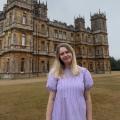
It is 25 years since an RAF pilot steered his stricken plane away from homes, averting a potential disaster. Group Captain David Ayton Haward, who lost his life, is still remembered as a hero by villagers. Kayleigh Fraser looks back at the events of that tragic night.
On a cold December winter night in 1998, disaster struck a seasoned RAF pilot after colliding with a telephone wire saw him crash in a farmer's field, and tragically lose his life.
Now, 25 years later, Group Captain David Ayton Haward OBE's quick thinking and heroic sacrifice that saved hundreds of lives is remembered by County Durham and his family.
Poised at the cockpit of a £17m RAF Hawker Harrier II GR7, Group Captain Haward, 45, was piloting a practice bombing run soaring at 600mph high in the skies above Stainton Moor, Durham on December 18, 1998.
The practiced aviator had just that year been promoted to Commanding Officer of RAF Wittering after flying through the ranks following his enlistment in 1971.
However, during the routine run, tragedy struck and Group Captain Haward faced an unrecoverable situation after flying into a telephone wire and was left with just 2.6 seconds to avert further disaster.

In his last moments, he was able to steer the falling aircraft away from homes in Stainton Moor and crashed in a field on Shepherds Lodge farm owned by a Mr Parkin. From that day on, Group Captain Haward has been hailed and remembered as a hero by the community of Stainton and Streatlam Moor.
In an interview for the RAF Benevolent Fund in 2018, his daughter Natasha who was just four-years-old at the time of the crash described the accident as simply “tragic”.

She said: “I hear a lot of stories from my mum, so he lives on quite strongly in our family. I get told about how close we were and how very fond of me he was.
“I think that is one of the hardest things – not necessarily growing up without a father but it’s about not knowing who he was and having that relationship.”
She went on to discuss the help the RAF’s benevolent fund has provided her family over the years, including support to follow her dreams of becoming an actress.
Following the incident, The Northern Echo ran a piece on December 19, 1998 as investigators were attempting to determine the cause of the crash and witnesses described what they saw.
One witness said the single-seater £17m jet may have struck an electricity pylon. Another witness heard the plane making a "loud groaning noise" seconds before it hit the ground.
Michael Littlefair, 32, was feeding sheep at West Farm, about one-and-a-half miles from the crash site.
He said a "big fireball" rose up when the Harrier GR7 plunged into the ground.

"I was watching two planes flying parallel over the fields," he said.
"All of a sudden one fell out of the sky and its nose went straight into the ground.
Mr Littlefair added: "I think it hit a pylon. It must have hit something." A resident living on a farm near the scene of the crash, who did not want to be named, described the noise of impact as "terrible".
Another local farmer, Brian Robson, said he heard an unusual noise coming from an aircraft flying above his farm.
"I ran outside and saw the plane straight in front of me," he said. "Its nose dived into the ground and it burst into flames." Mr Robson rushed to the scene where he found a huge crater with the smouldering plane inside.
Group Captain David Ayton Haward OBE now rests in peace at All Saints Church Yard at Wittering near Peterborough, remembered as a military man, a fine airman, and a hero who made the ultimate sacrifice in service to his country.




Comments: Our rules
We want our comments to be a lively and valuable part of our community - a place where readers can debate and engage with the most important local issues. The ability to comment on our stories is a privilege, not a right, however, and that privilege may be withdrawn if it is abused or misused.
Please report any comments that break our rules.
Read the rules here